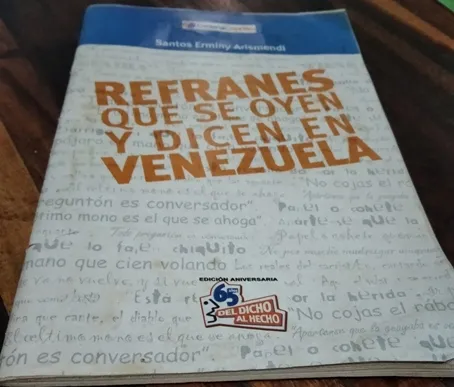

Es un refrán que indica que no es necesario ni sano, llorar las penas de otras personas, o asumir deberes que no nos corresponden. No es un llamado a la indolencia o a la falta de solidaridad, pero sí a la objetividad y el estar claro en que cada quien ha de asumir sus propias responsabilidades.
Un dicho que se emplea para decir, que a la luz nocturna, muchos detalles pueden pasar inadvertidos, como por ejemplo algún detalle en la vestimenta o en la presentación personal, ya que a esas horas, la oscuridad no permite observar con total claridad a las personas ni al entorno.
Es un dicho que se emplea para resaltar o exagerar la fealdad de algo o de alguien, o quizás de alguna situación; pues no hay nada más feo que un hijo le pegue a su propia madre.
Yo particularmente estoy en desacuerdo con este refrán, pues señala la imposibilidad de que las personas mayores puedan aprender algo nuevo, y eso es una falsedad, ya que personas incluso ancianas, tienen la capacidad de familiarizarse y aprender cosas nuevas, como por ejemplo relativas a la tecnología y desenvolverse eficientemente en ellas. Y por otra parte, los loros viejos sí pueden aprender a imitar algunos sonidos, quizás con menos eficacia que un loro joven, pero igual pueden aprender.
Significa este dicho, que existe cierta disposición a que ocurra algo o a que alguien se comporte de cierta y determinada manera, y adicionalmente esto se ve estimulado por la intervención de alguien más, es como si además de que ya existe la condición, alguien más la incremente. Es un dicho que se aplica por lo general a situaciones o a conductas negativas por parte de las personas.



It is a saying that indicates that it is not necessary or healthy, to mourn the sorrows of other people, or to assume duties that do not correspond to us. It is not a call to indolence or lack of solidarity, but rather to objectivity and being clear that everyone has to assume their own responsibilities.
A saying that is used to say that in the night light, many details can go unnoticed, such as some detail in the clothing or in the personal presentation, since at that time, the darkness does not allow to observe with total clarity at the people or the environment.
It is a saying that is used to highlight or exaggerate the ugliness of something or someone, or perhaps some situation; well, there is nothing uglier than a son hitting his own mother.
I particularly disagree with this saying, as it points out the impossibility for older people to learn something new, and that is a falsehood, since even elderly people have the ability to become familiar and learn new things, such as related to technology and operate efficiently in them. And on the other hand, old parrots can learn to imitate some sounds, perhaps less effectively than a young parrot, but they can still learn.
This saying means that there is a certain disposition for something to happen or for someone to behave in a certain and certain way, and additionally this is stimulated by the intervention of someone else, it is as if in addition to the condition already existing, someone else did it increase. It is a saying that is generally applied to negative situations or behaviors on the part of people.

Dear readers, below I place the links of the first 24 posts, in case you want to read them:
Víctor Vera Morales. (Agosto 2004). Refranes y Comidas de Venezuela. Editado por el Instituto Municipal de Publicaciones de la Alcaldía de Caracas.
Santos Erminy Arismendi. (2006). Refranes que se oyen y dicen en Venezuela. Cadena Capriles, Caracas. Venezuela.
- Fotos de mi autoría, tomada con un teléfono REDMI 8A, intervenida con WordArt / Photos of my authorship, taken with a REDMI 8A telephone, intervened with WordArt.
- Los diseños incluidos en esta publicación, han sido elaborados por mi persona con la aplicación CANVA / The designs included in this publication has been made by me with the CANVA application.
In the event that it is required to use the content or images of this post and my other publications, I would be grateful if my authorship (Fabiola Martínez) was made and the corresponding link was cited. Thank you.

 CommunityIIDiscord
CommunityIIDiscord